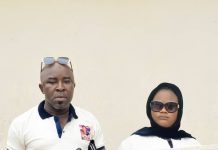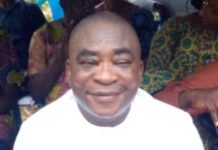Que: How long have you been in the saddle of IMOSACA?
Ans: Ok, I started piloting the affairs of the Agency in 2011, after passing through a rigorous and necessary recruitment procedure.
Que: What exactly is your duty as the DG of your Agency with respect to National Agency for the control of HIV/AIDS (NACA) in Abuja?
Ans: My duty as the DG IMOSACA is primarily to coordinate all the various programs for the prevention of HIV/AIDS in the state, get the feed backs (reports) and update the mother Agency (NACA). We receive necessary technical and financial assistance from the mother agency.
I can say we are in the coordinating capacity, those incharge of implementation are the financial partners, like the civil societies, missionaries, we at SACA only coordinate them to make sure that what so ever they are doing conform to the landown guideline by mother agency. For example, when a group wants to provide condoms, and we discover there is already a provision for that, we advice the group when next to come so that their contribution will benefit the society.
Que: Before your appointment to this Agency, have you been involved in any programme/project in the fight against HIV/AIDS?
Ans: Well, before my coming here as IMOSACA DG, I have been the Imo State HIV/AIDS programmes coordinator in the Imo State Ministry of Health between 2005 2011.
Que: That’s five years?
Ans: Yes!
Que: Doc with your experience in the fight against HIV/AIDS as a State Coordinator in the Ministry of Health what are your challenges now as a DG?
Ans: When it comes to challenges, it cuts across all the 36 states of the Federation, having to depend on the Mother Agency in Abuja for everything. That is a big challenge. For example in the area of funding, the state governments and the federal government should assist the World Bank and other donor Agencies. Another prominent challenge is on the area of human resource; the Agencies need more human resources to go down to the rural communities/villages in order to meet with the target.
Que: How do you mean?
Ans: You know that there is no disease as dangerous as ignorance, therefore the rural areas are victims of ignorance and need the doggedness of enough human resource to fight ignorance. There is need for more information, enlightenment and awareness on the preventive and management measures on the HIV/AIDS.
Que: This issue of gay marriage how does it affect the scourge of HIV/AIDS in the state?
Ans: Yeah! The issue of HIV/AIDS is becoming more prevalent among men having sex with men. Sometime ago we had a seminar for about fifty young gays in Imo. We made them realize that indulging in gay practice is an easy way of contacting the HIV virus. We know that lesbians are also out there. We are trying to see how the Agency will tackle the spread of such acts that is morally and spiritually unacceptable to help check the menace of HIV/AIDS. The survey also revealed that these young boys and young girls have older, wealthy and influential same sex partners.
Que: How many outlets do you have in your agency to handle the challenges?
Ans: Right! We have what I can call a multi sectoral approach, which involves everybody, including you the media. It is not something that has to do with only the government, Ministry of Health, civil society, organization or the churches, No! it is a holistic thing, everybody/we all are involved and part of the responses. All we do is to make sure that the approach will have a holistic type, where we involve all the sectors involved in the response. Like we are working with the 27 Local Government Areas of the state who are empowered to cover all the rural communities within their jurisdictions. However, we are in the process of getting the civil society organization that works specifically on HIV/AIDS to complement the efforts of the LGAs. The Agency is also collaborating with the churches on the dissemination of proper information on HIV/AIDS to attain zero HIV infection, and zero stigmatization on those infected.
By the time all sectors work holistically in the communities I tell you, HIV/AIDS will become like every other disease we have around us. And the fact is that we have engaged all necessary sectors and that is why we are achieving results.
Que: What do you mean by achieving results?
Ans: I tell you, we have been able to reduce HIV/AIDS prevalence in the state since we came on board in 2011 from 4.6% to 3%. Infact the lowest in the South-South and South East region of the country and also expecting further reduction by June when the latest rating will be published by the mother agency.
Que: With your experiences on the HIV/AIDS disease, the reduction project and programs, what is your professional advice to the general public?
Ans: My brother, HIV/AIDS should no longer be seen as Oria obiri na-aja ocha because right now the disease is more manageable than many other chronic diseases, like diabetes, cancer and so on. For HIV/AIDS patients who are taking their routine drugs, they should be example of what am trying to explain because you see them live normal live just like you and I. I advice them to continue with their drugs. And if you are negative continue to check your status.
We should above all take our HIV/AIDS infected brothers and sisters as part of us, show them love and care because they are not different from people having diabetes and what have you, say No to stigmatization and discrimination.
Que: Thanks for your time and information.
Ans: You are welcome.











